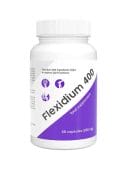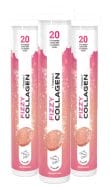Collagen is an important component of connective tissue responsible for the good condition of skin, tendons, joints, bones and cornea. It makes our skin smooth and taut, joints function efficiently, bones are strong, and blood vessels are flexible enough to allow proper blood circulation. When it becomes deficient with age, unpleasant external symptoms and various health complaints appear. Find out how to supplement natural collagen deficiencies.
Table of contents
Collagen – properties and types
Natural coll agen is a protein produced by the body, which is a building block of connective tissue. Stretchy and strong, collagen fibres are part of the skin, cartilage, tendons and bones, becoming a kind of glue between individual tissues. They protect internal organs and keep them in a proper position. Collagen is responsible for the renewal of skin cells, flexibility and mobility of joints, strength of teeth and bones, and cartilage regeneration. It also plays an important role in the functioning of the immune system, inhibiting the growth of pathogenic bacteria and cancer cells.
In young organisms there is usually enough of this protein for the regeneration and renewal processes to proceed properly. However, with age, the body’s ability to reproduce collagen fibers is reduced, and the processes of degeneration begin to prevail over the processes of renewal. Adverse changes can accelerate such factors as disease, stress, smoking, environmental pollution.
With increasing deficiencies of collagen and disorders in the regeneration of collagen fibers, external signs of skin aging appear, as well as health complaints such as pain and degeneration of joints, frequent bone fractures, parodontosis, weakness, anemia.
Science now distinguishes dozens of types of collagen. The most important of these are:
- Type I coll agen – responsible for the condition of internal organs, bones, joints, skin, hair and nails
- typeII collagen – supporting the structure of articular cartilage
- collagen typeIII – playing an important role in the construction of tendons and connective tissue, teeth, as well as bones and cartilage
With regard to its origin, we distinguish pork, beef, poultry and fish collagen. Currently, fish collagen is the most valued, because it works by, among other things, effectively rebuilding the natural collagen fibres present in the human body. In addition, it is fish collagen that has a major impact on the condition of the skin and hair, it also speeds up wound healing processes.
Read also: Diet for hair
The effects of collagen loss on the skin

Collagen, responsible for the elasticity and resilience of the skin, is a kind of structure that holds the skin. In a young body it is stable and strong, but as we age, due to the depletion of substances that support the natural regeneration of collagen fibers, it ages, losing its strength and durability.
As a result, the condition of the skin deteriorates, and the signs of this are, unfortunately, visible primarily on the face and neck. The skin loses its firmness and elasticity, wrinkles, furrows and discoloration appear, eyelids and cheeks droop, skin becomes dry and thin.
Changes also affect other parts of the body, hence the appearance of cellulite, stretch marks, dilated or broken blood vessels, or spider veins. The condition of hair and nails deteriorates. These processes are favoured by unfavourable environmental factors – solar radiation or toxins and pollutants present in our environment.
No wonder that in order to maintain a youthful appearance for as long as possible more and more people are reaching for cosmetics and supplements containing collagen.
Check: How to strengthen eyelashes
Collagen and joints
Joints are movable connections of bones in the so-called bed. The body produces fluid, and the joint surfaces are covered with cartilage and articular membranes so that there is no friction, and thus joints do not cause us pain and are functional. Collagen plays a huge role in the proper functioning and good condition of joints. It is responsible for the proper level of synovial fluid production and affects the condition of cartilage, its hardness and elasticity, i.e. determines the efficiency and mobility of joint joints. Moreover, it accelerates the regeneration of pathologically changed areas, as well as reduces rheumatic complaints.
An effective collagen supplement supporting joint health:
Flexidium 400

Collagen in food
Collagen of animal origin can be found in many food products: fruit jellies, pork and veal leg jellies, offal, pork knuckles, various types of delicatessen products such as brawn. However, it is difficult to imagine a daily diet containing large amounts of such products, especially for people who value a healthy lifestyle.
That’s why it’s better to take supplements to compensate for deficiencies of this substance and to do it well in advance, before the troubles of menopause and old age hit us, especially since the amount of collagen in the body decreases after thirty. Of course, if wrinkles or joint pains appear, collagen supplementation will be all the more useful, in order to mitigate the effects of its lack and to stay healthy and younger looking for longer.
Collagen – opinions on supplementation
As with other supplements, we now have both collagen in tablets and in other forms. However, the most popular is drinking collagen, most often in the form of capsules or powder to be dissolved in water.
Importantly, because collagen requires vitamin C for proper synthesis, it is worth choosing a product that contains both of these substances. Such a supplement, offering the most valued marine collagen in combination with vitamin C and other ingredients affecting beauty, is FizzyCollagen++. The preparation contains collagen obtained from sea fish, which, thanks to its structure similar to human collagen, is highly assimilable and very effective.

Read also: FizzyCollagen+ review

